Report on Sophia University’s UN Weeks October 2023
Marking its 20th round, the Sophia University United Nations Weeks October, 2023 was held from October 7 to 24 with the concept of “Thinking about the world and our future through the work of the United Nations.” On November 11, a post-program event was held, and a total of eight programs covering a wide variety of topics were presented.
The Gaza Strip today as seen from the perspective of Palestinian refugee youth – Japan and UNRWA 70th anniversary
On October 7th, the opening event of the UN Weeks October 2023 was held. The overall facilitator was Ms. Nikki Tsukamoto Kininmonth, a translator and a radio personality. Professor Yasuhiro Ueki, Graduate School of Global Studies, Director of Human Resource Center for International Cooperation, gave opening remarks, providing historical background on Palestinian refugees, and introducing the United Nations Relief and Works Agency for Palestine Refugees (UNRWA).
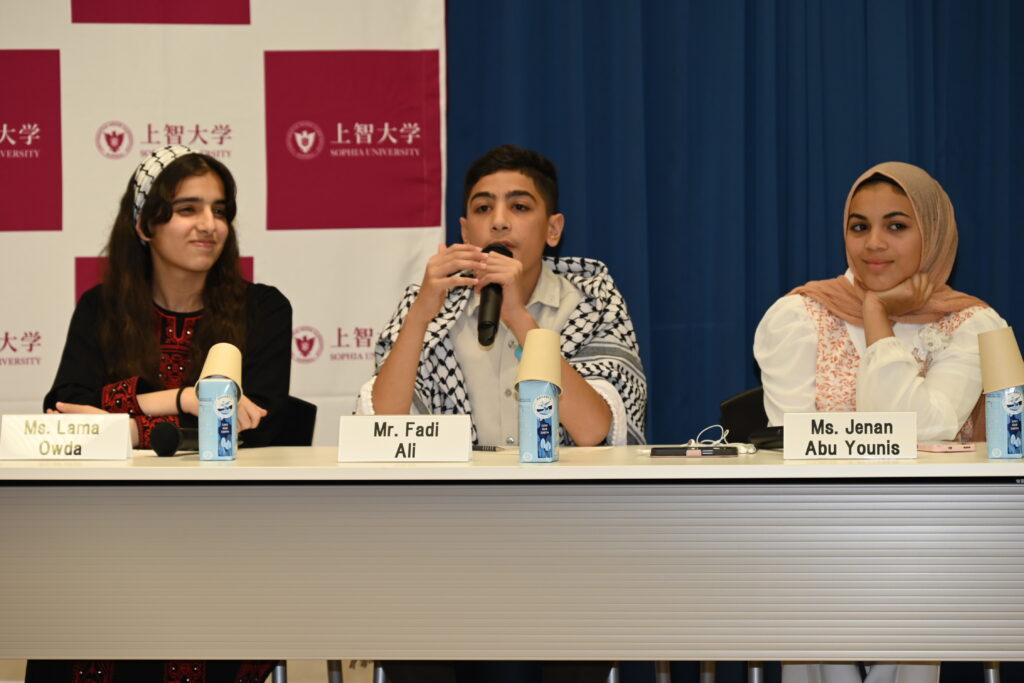
Next, Mr. Akihiro Seita, UNRWA Director of Health, gave an update on operations in the area. Ms. Tsukamoto then introduced three guests, middle school students from UNRWA schools in Gaza (Lama Y.A. Owda, Fadi S.M. Ali, and Jenan Y.M. Abu Younis), who each gave a presentation on their dreams for the future, and their interests, etc. The three are representatives in the student council and are also in charge of communicating school and community issues to UNRWA’s policy makers.
Through those activities, they have learned responsibility and leadership skills. Both expressed their gratitude for the high-quality education they received through UNRWA, adding memorable statement, “Education for us is like an air we breathe.” When asked about his impressions after spending a week in Japan during their first trip abroad, one of them responded, “I was shocked to learn that Japan had also experienced difficult times in the past and had overcome those hardships, and I felt that we share those experiences in common. I sensed a cultural connection between Palestine and Japan, and I also very much enjoyed the exchange with local high school students.”
In the latter half of the symposium, a message was sent from the panelists to the young people of Japan, who are said to having difficulty finding dreams and passions, and also a variety of questions were raised to discuss including what can be done in order to promote harmonious living among our peoples. Finally, Prof. Ueki concluded the symposium by commenting, “In this age of Internet accessibility, young people in Japan and Gaza can connect to support each other. Let’s look for what can be done even if it’s small.”
Special lecture by Prof. Tshilidzi Marwala, Rector of the United Nations University (Under-Secretary-General of the United Nations)
October 10th, a special lecture was held by Professor Tshilidzi Marwala, who assumed Rector of the United Nations University (Under-Secretary-General of the United Nations) as of March 1, 2023. Professor Yasuhiro Ueki, Graduate School of Global Studies, Director of Human Resource Center for International Cooperation, moderated the event.
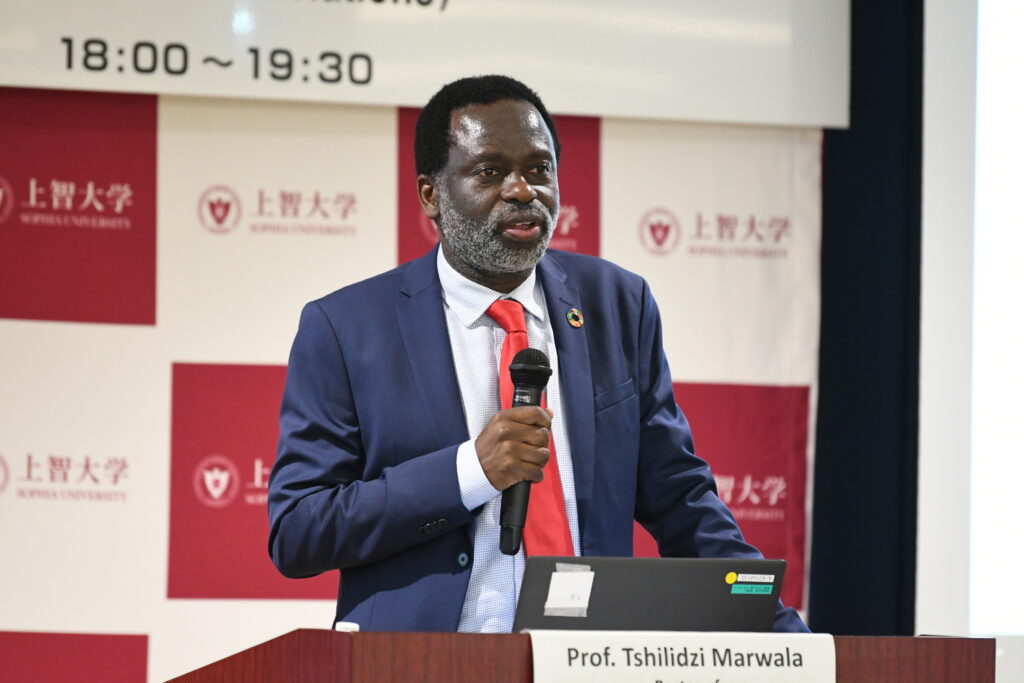
First, Prof. Marwala, who specializes in artificial intelligence (AI), gave a lecture titled “Artificial Intelligence (AI) and its Governance.” Referring to the historical background of AI, which dates back to 1950, he then cited two reasons why AI is now attracting attention: (1) the accumulation of vast amounts of data and (2) the improvement of computer performance.
Then, he explained how AI can respond to the UN’s SDGs with specific examples, pointing to the potential of economic forecasting to meet personalized demand in its 8th goal “Decent work and economic growth”. He also suggests that as to the 16th goal, “Peace Justice and strong institutions” that AI can contribute not only to end conflict, but also to predict and prevent it. He listed ethics, laws and regulations, and security as future issues, and explained the need to improve governance as a way to deal with AI.
Then Professor Tad Gonsalves, Faculty of Science and Technology at Sophia University who specializes in artificial intelligence and machine learning, gave a presentation on the current state of AI and its potential for the future. First, he explained what AI is currently capable of. He then defined the future target of AI to be at human level and outlined the prospects of artificial emotional intelligence and artificial general intelligence. “Humans can make AI learn both good and bad,” he explained and emphasized the need of guidelines that assign ethical values to AI.
The second half of the event was a panel discussion in which the two speakers responded to questions from the audience. Questions included, “Will AI take away people’s jobs?” “How might it be used in the field of international cooperation in the future?” Prof. Ueki concluded the lecture by stating, “AI is evolving so rapidly that it is hard to keep up with it, but we shall do our best to minimize the negatives and maximize the positives going forward.”
Bringing the combined wisdom of science and engineering to the world
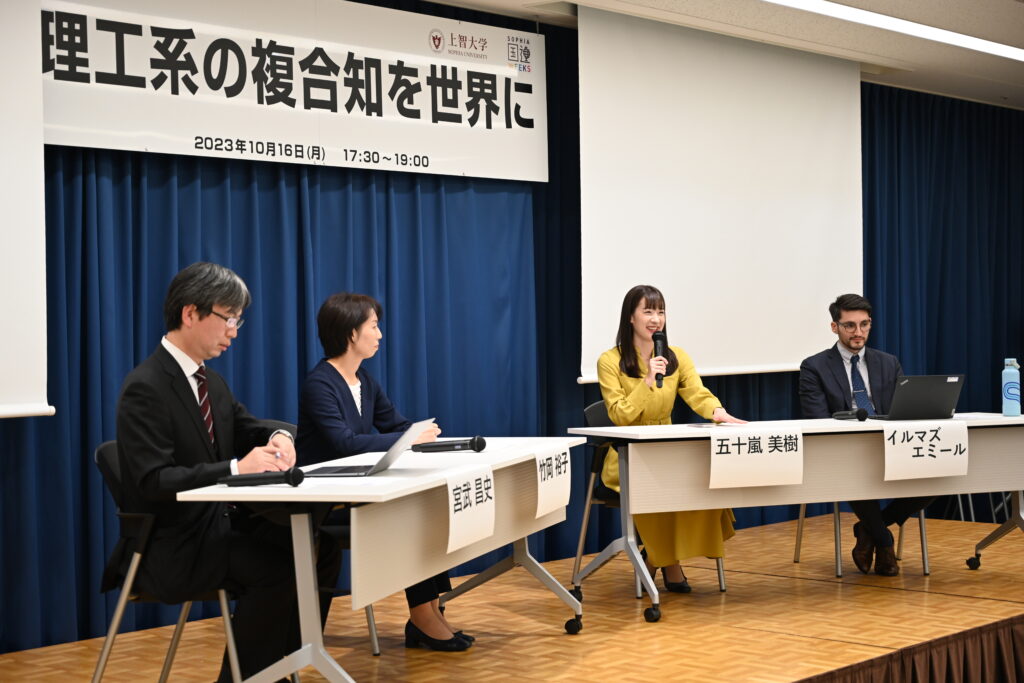
On October 16, a symposium entitled “Bringing Combined Wisdom of Science and Engineering to the World” was held in collaboration with the Faculty of Science and Technology. The symposium was organized by Professor Masafumi Miyatake and Professor Tadashi Adachi of the Department of Engineering and Applied Sciences, Faculty of Science and Technology, as an opportunity to discuss the significance of international deployment of “composite knowledge” and “STEM education” for a sustainable society and to explore future prospect for English courses in the Faculty of Science and Technology. The guest speaker was Ms. Miki Igarashi, an internationally renowned science entertainer, a graduate of our university, who is also a specially appointed associate professor in the Faculty of Human Life Sciences at Tokyo City University.
Following the opening address by Prof. Miyatake and Dean Tomoharu Shibuya of the Faculty of Science and Technology, Prof. Adachi gave a speech on “The Initiatives of English Courses in the Faculty of Science and Technology at Sophia University”. Then, guest speaker Ms. Igarashi gave a lecture titled “Efforts as a Science Entertainer – How to find a career in science that is uniquely your own.” She introduced her works in Japan and overseas and talked about how her studies at Sophia University have been useful in her career. She encouraged the attending students to realize their own dream science career.
In the latter half of the symposium, Prof. Miyatake moderated a panel discussion with Ms. Igarashi, along with Professor Yuko Takeoka of the Department of Materials and Life Sciences, and Assistant Professor Emir Yilmaz of the Department of Materials and Applied Sciences. In her opening remarks, Prof. Takeoka touched on the current status of Japan, where the percentage of women pursuing science and engineering degrees is the lowest in the OECD, in terms of diversity. Prof. Takeoka expressed, “It is essential to show women that they have options and possibilities in science and engineering, and that we need someone like Ms. Igarashi to show this in an easy-to-understand manner.” Based on her own experience, Ms. Igarashi said, “I would like to empower and encourage female students, especially those in rural areas, who may feel insecure about their future career in science and engineering.” Mr. Yilmaz introduced his own experience of studying abroad and made a comparison about learning between his home country, Turkey, and Japan. Attending students agreed on the value of learning together with people from diverse backgrounds.
Speaking of the appeal and potential of the Faculty of Science and Technology, the need for diversity not only in terms of nationality and gender but also in terms of disciplines was emphasized, and Prof. Miyatake summarized, “I hope that our English course will become an international hub of combined wisdom and that the faculty will evolve as a diverse and well-balanced organization.” The event concluded on a high note with closing remarks given by Prof. Adachi.
International Cooperation / Organizations Career Workshops
A career workshop was held on October 20th for those considering a career in international organizations or international cooperation.
To open the session, Professor Yasuhiro Ueki, Graduate School of Global Studies, Director of Human Resource Center for International Cooperation, who served as moderator, introduced the speakers. Ms. Mari Yamashita (Graduates of the Faculty of Law), Representative of the UN Secretary-General and Director of the UN Office in Belgrade, delivered an onlin lecture from Belgrade, and Ms. Mihoko Kumamoto, Director of Division for Prosperity, United Nations Institute for Training and Research and Head of Hiroshima Office, delivered an online lecture from New York, where she was on business.
The workshop was attended by Mr. Tetsuo Kondo, former Director, Representation Office of the United Nations Development Programme in Tokyo and Specially-Appointed Professor at Kyoto University, Ms. Hideko Hadzialic, Director of the United Nations Development Programme (UNDP) in Tokyo, Mr. Yoshiteru Uramoto, former Specially-Appointed Professor at Sophia University and Senior Consultant, GR Japan, Mr. Ryoto Hatori, Assistant Director, Recruitment Center for International Organizations, Ministry of Foreign Affairs, Japan, Mr. Kuniaki Yamashita, former UNESCO staff member and Professor Naoki Umemiya, the Center for Human Resource for International Cooperation, in addition to its Director, Prof. Ueki, as well as Ms. Eri Yamazaki, Center for Global Education and Discovery.
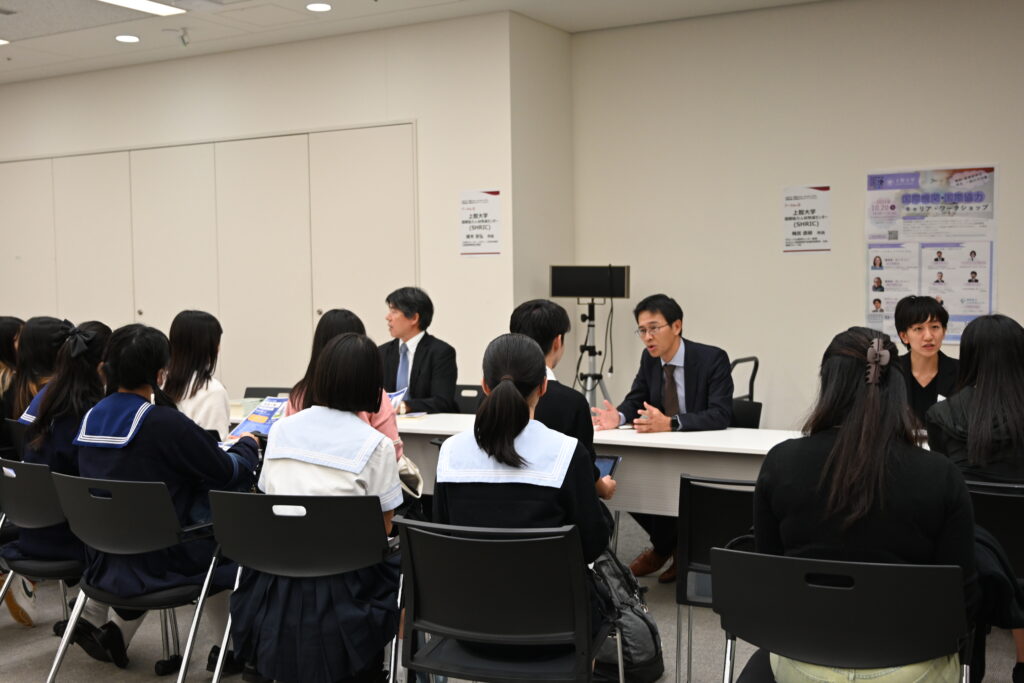
In their special lecture, “Promoting a Global Career,” Ms. Yamashita and Ms. Kumamoto introduced their own careers first, then added, “Language skills, analytical skills, creativity, and heart to embrace others are essential for global professional. Although the number of Japanese staff at the UN is still small, highly valued and welcomed,” they told the audience. The special lecture was also streamed online, and many attended from outside the venue.
After the lecture, a face-to-face workshop was held. Students including those from high schools aiming to work for international organizations or in the field of international cooperation gathered and engaged in enthusiastic discussions at each of the booths.
New Challenges in Education for Justice and Inclusion
On October 21st, a symposium was held to discuss how to realize the educational goal of the SDGs “Quality Education for All” in the midst of a multitude of global issues, in collaboration with ProSPER.Net, which Sophia University is part of, the United Nations University, UNESCO, the Ministry of Education, Culture, Sports, Science and Technology, the Ministry of the Environment, and Sophia University. Ms. Miki Konishi, Program Coordinator for UNU Institute for Advanced Studies of Sustainability moderated the symposium. At opening greetings were made by Prof. Tetsuo Morishita, Sophia University Vice President for Globalization, Prof. Deepak Sharma, President of ProSPER.Net, Asian Institute of Technology, Dr. Shinobu Yamaguchi, Director of the United Nations University Institute for Advanced Studies of Sustainability, and Mr. Reiji Higashioka, Director, Ministry’s Secretariat, Office of Environment Education, Ministry of Environment Japan. They all agreed that Corona crisis or climate change may have contributed to inequalities and disparities around the world and caused great disruption in education, nevertheless, to work beyond national boundaries toward achieving a sustainable society.
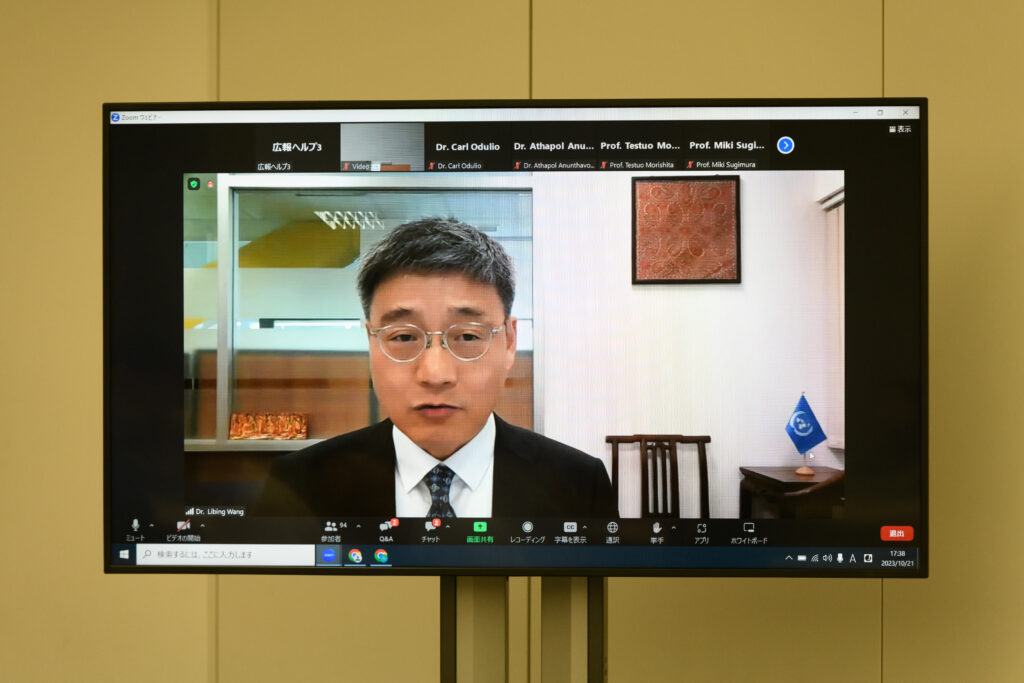
Then, Dr. Libing Wang, UNESCO Regional Office for Bangkok, delivered a keynote speech titled “Equity and Inclusiveness: Transformational Challenges for Higher Education in Asia and the Pacific”. Dr. Wang stated that equity and inclusion in education is an important theme for reshaping higher education in the Asia-Pacific region, as its prominence has increased due to the significant impact of Corona crisis. He then made specific proposals for classifying and analyzing disadvantaged populations, considering equity and inclusion from recruitment stage, ensuring equal access to various fields of study and research, and making job placement a subject of evaluation.
Next, a panel discussion was moderated by ProSPER.Net Vice President and Professor Miki Sugimura of the Department of Education, Faculty of Human Sciences. Mr. Yosuke Kobayashi, Director for International Affairs Division, Higher Education Bureau, MEXT; Dr. Athapol Anunthavorasakul, Department of Education, Chulalongkorn University; Dr. Carl Odulio, University of the Philippines Dillman; and Prof. Tomonori Ichinose of Miyagi University of Education and Mr. Brenson Andres, a doctoral student in the Graduate School of Education at our University of Education participated as speakers. Prof. Sharma, representative of ProSPER.Net, wrapped up the session.
In closing remarks, Dr. Jonghwi Park, Head of the Innovation and Education Programme, UNU IAS concluded that “Equity and inclusion in education cannot be achieved by a single sector alone. Cooperation among higher education institutions, UN agencies, the private sector, and governments is critical.”
How to shift to sustainable food systems?
On October 23rd, an online symposium was held to discuss the development of a sustainable food system. Professor Masachika Suzuki of the Graduate School of Global Environmental Studies moderated the symposium.
In his keynote speech, Eric Ponthieu, former Head of Unit for Agriculture, Regional Development and Environment at the European Economic and Social Committee, explained the “Farm To Fork” strategy being promoted in the European region. This is a policy to promote the conservation of the natural environment, biodiversity, and resources along the food chain from producer to consumer and is attracting attention worldwide. Mr. Ponthieu emphasized that the time has come to transform the way we have been operating at every stage of food production, distribution, consumption, and disposal, and to do so while protecting the earth’s environment. And in order to maintain food security while protecting the earth’s environment, we need to promote these policies not only within the EU, but worldwide.
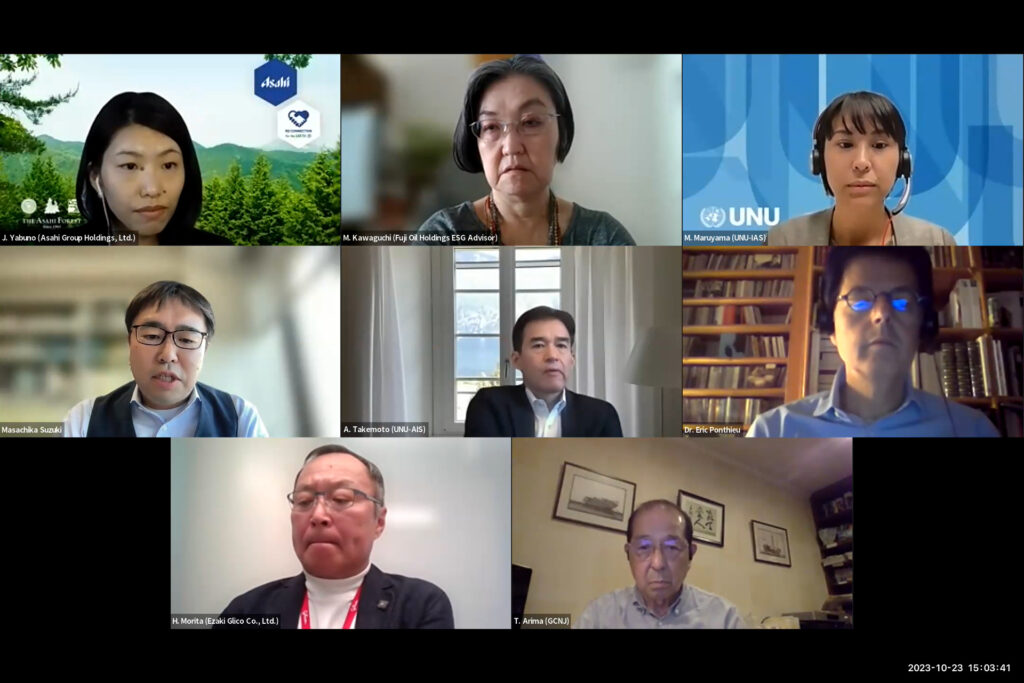
In the panel discussion that followed, the efforts of various food product manufacturers, including Asahi Group Holdings, Ezaki Glico, and Fuji Oil Holdings, to address the SDGs were introduced. Mr. Akio Takemoto of UNU Institute for Advanced Studies of Sustainability also pointed out that global crises such as spread of coronaviruses and warfare have had a tremendous impact on the food system. When a participant asked what should be done to change people’s awareness, the panelist responded that it is necessary for business enterprises to have extensive contact with consumers and continue to communicate food-related issues and corporate efforts to address them.
Mr. Toshio Arima, Chairman of the Board of Global Compact Network Japan, co-organizer of the symposium, concluded the symposium by addressing, “As stated in the 17th goal of the SDGs, it is important for countries, companies, experts, and individuals to cooperate with each other and continue to work together.”
The Role of the United Nations in East Timor
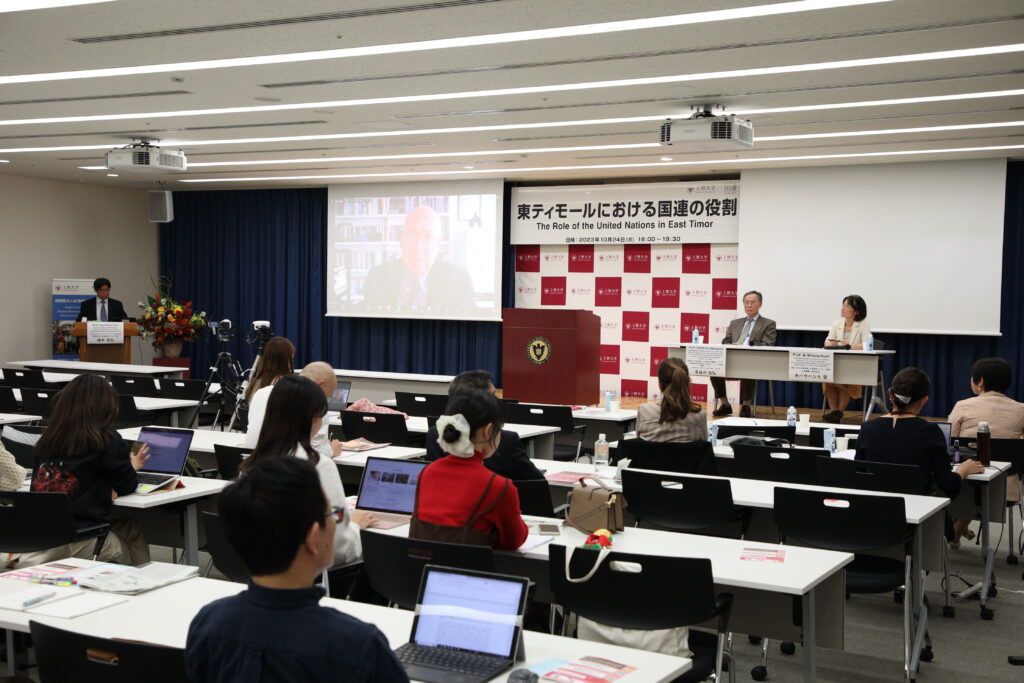
East Timor is one of the countries where the United Nations has been contributing to their conflict resolution. On October 24th, UN Day, a symposium was held to discuss how peace was restored there, and the role of the UN in peacemaking and peacebuilding, as three panelists presented their views on the role of the UN. Professor Yasuhiro Ueki, former Political Affairs Officer and Deputy Spokesman of the UN Mission in Timor-Leste and current Professor at the Graduate School of Global Studies, served as moderator.
Ms. Kaoru Nemoto, Director of UN Information Center, opened the symposium by presenting a message from UN Secretary-General Antonio Guterres on UN Day. She then introduced “New Challenges for Peace,” one of the key issues for the UN Future Summit to be held next September, and expressed her hope that this symposium would lead to its discussion.
Following, Mr. Ian Martin, former Special Representative of the UN Secretary-General and Head of the UN Mission in Timor-Leste, took the podium to talk about the establishment of the UN Mission in 1999 and how the UN has been involved in the Timor-Leste issue, introducing photos of the referendum that led to the country’s independence. He emphasized that the UN’s speedy implementation of the referendum was a great accomplishment, despite the fact that the staff was deployed in a situation where their lives and security were at risk.
Next, Ms. Ai Kihara-Hunt, former Human Rights Officer of the United Nations Transitional Administration in East Timor and current Professor of the Graduate School of the University of Tokyo, took the podium and shared stories of setting up an office in the outback of East Timor and receiving consultations and requests from hundreds of local residents regarding their human rights. Through this experience, she said “I want to reiterate how the UN has contributed to peace by maintaining legitimacy and relevance.”
Last, Mr. Sukehiro Hasegawa, former Special Representative of the UN Secretary-General and Head of the UN Peacekeeping Mission in East Timor, and current Distinguished Professor at Kyoto University of Arts and Director of the Kyoto International Peacebuilding Center, took the stage and described the main reasons for the success of the peacebuilding after independence. The primary factor was that the UN emphasized dialogue with Timor-Leste and supported them from the viewpoint of their people. Another reason, he stressed, was that the East Timorese leaders chose the path of reconciliation and friendship instead of pressing the leaders of the occupying power, Indonesia, to trial.
Participants asked a range of questions including solutions to poverty and education, showing a high level of interest in the topic.
Where is Japan’s development aid headed ? -in response to the revision of the Development Cooperation Program Guidelines-
Following the Cabinet decision on the new “Development Cooperation Framework” this past June, a symposium was held on November 11 to discuss how it will affect development aid practice, as well as research and human resource development in the future. The symposium was held as a post-UN Weeks event that also served as a plenary for the national conference of the Japan Society for International Development (JSID) and was chaired by Professor Taro Komatsu of the Department of Education, Faculty of Human Sciences and Chair of the conference’s Executive Committee.
Mr. Yoichi Mine, Director of the Sadako Ogata Institute for Peace and Development Studies of the Japan International Cooperation Agency (JICA), opened the session with a keynote speech entitled “The New National Program Guidelines and Human Security: Where is Development Cooperation Going?” Based on his experience as a member of the Advisory Panel on the Revision of the NDPG, Mr. Mine explained in detail the revision process and structure of the Program Guidelines. He then listed three particularly important points to be addressed in the NDPG: “Promotion of participation in international cooperation by local governments and local universities,” “Efforts for co-creation of values,” and “Deepening of the human security concept.”
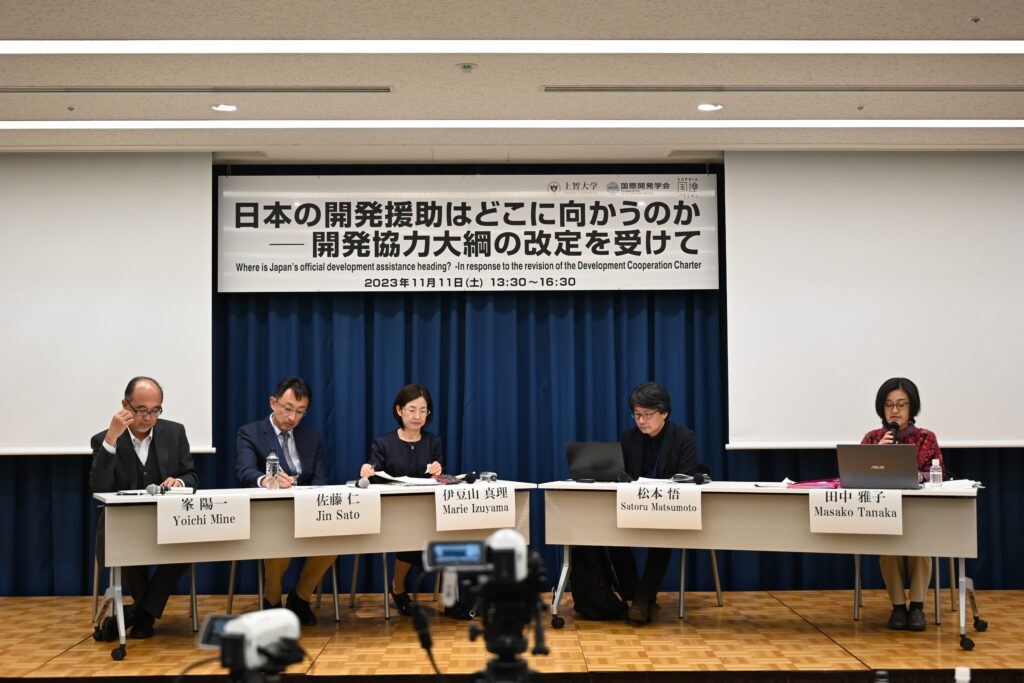
Following the keynote speeches, the three speakers for the second half of the discussion made comments. Mr. Jin Sato, President of JSID and Professor at the University of Tokyo’s Institute for Advanced Studies on Asia (IOC), stated that it is necessary to review the past of ODA in order to discuss its future. He also stressed the need to develop human resources for international cooperation and proposed concrete measures to achieve this goal. Ms. Marie Izumiya, Director of Security Studies Department at the National Institute for Defense Studies (Graduates of the Faculty of Law), talked about the strategic application of Japan’s ODA from the perspective of South Asian countries such as India and Sri Lanka, and their reaction to its securitization. Mr. Satoru Matsumoto, Professor of the Faculty of Intercultural Communication at Hosei University and a member of the Development Cooperation Accountability Committee of the Ministry of Foreign Affairs, spoke on the need of monitoring the operation of the revised ODA Charter and discussing its subsequent revision.
Then, video letters from international scholars and civil society leaders were presented. S. M. Ali Reza, Professor of Political Science, University of Dhaka from Bangladesh; Dennis Trinidad, Professor of International Studies, De La Salle University from the Philippines; and Paul Okumu, Executive Director of Africa Platform from Kenya, addressed the challenges posed by the concurrent establishment of the OSA and issues related to benefit enhancement of the private sector.
To conclude the session, Mr. Mine, Mr. Sato, Ms. Izuyama, and Mr. Matsumoto all took the podium. Professor Masako Tanaka of the Faculty of Global Studies served as moderator, and in response to questions from the audience, a wide range of topics were discussed, including human security, OSA, and the creation of shared values for the post-SDGs era, bringing the three-hour symposium to a successful end.